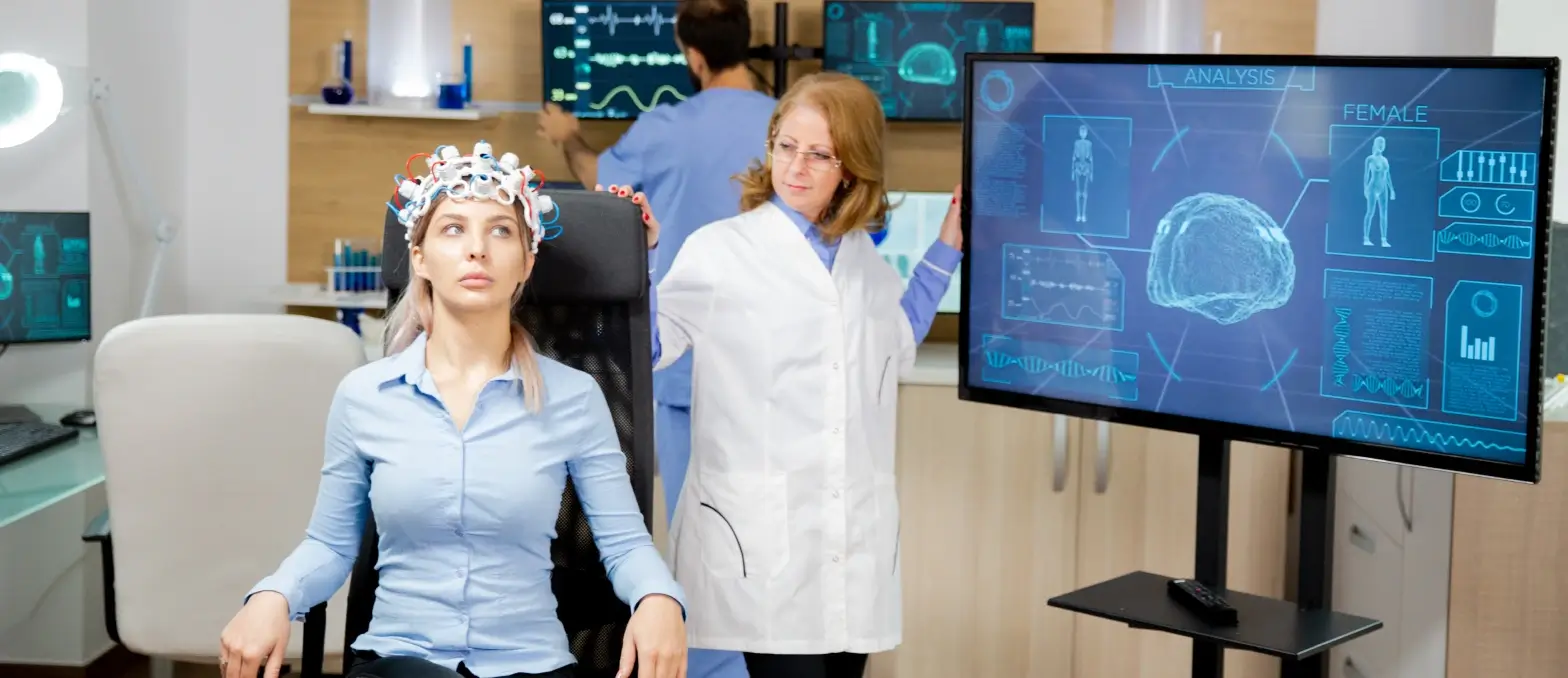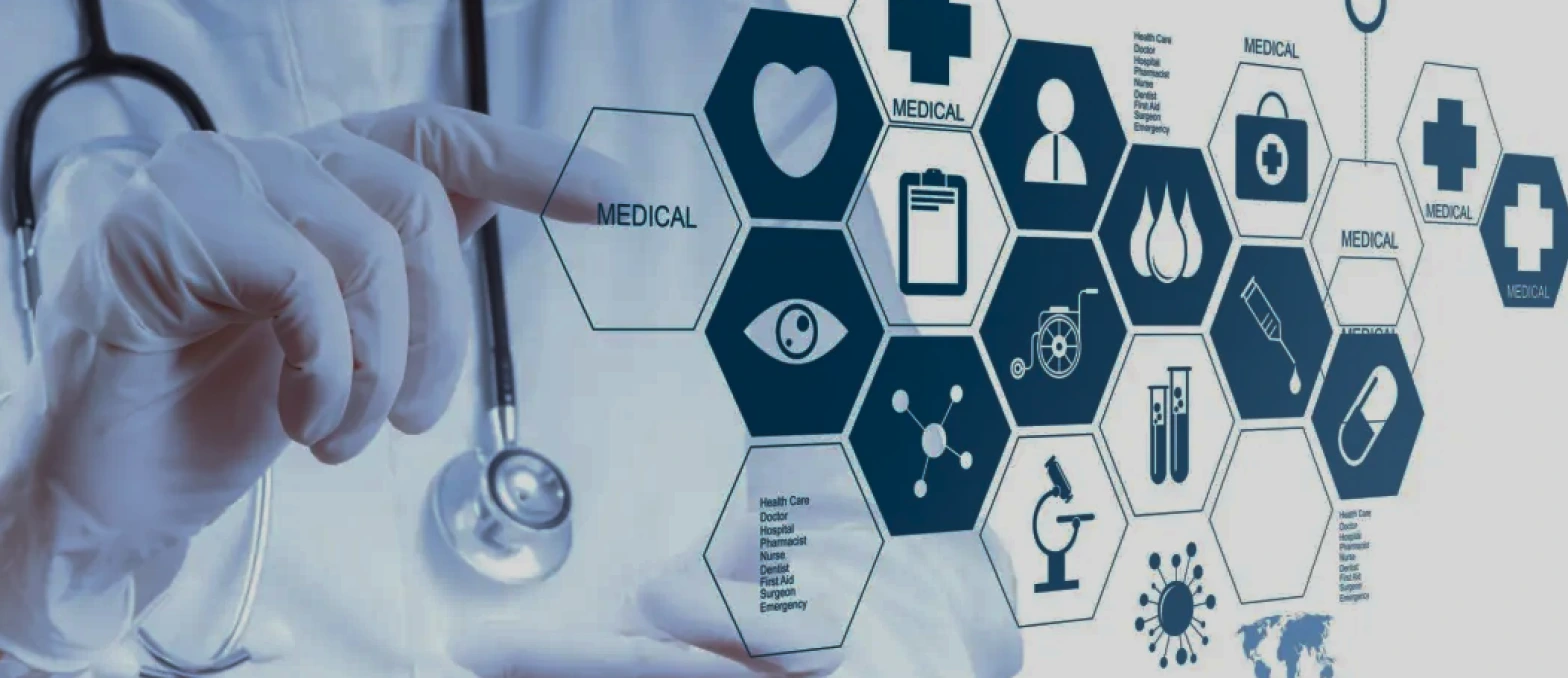“Hospital Management Systems empower individuals to take charge of their well-being, making wellness a daily priority.” – Dr. Emily Thompson, HealthTech Specialist
Developing a hospital management system is a difficult yet significant undertaking in the present healthcare industry. This software assumes an essential part in smoothing out managerial errands like case management and finance, while additionally upgrading patient consideration and guaranteeing the smooth activity of clinical offices. Research from Mayo Clinic highlights that personalized treatment plans based on Genomic Medicine within Hospital Management Systems have shown a 15% improvement in treatment success rates. In this complete aid, we will separate the cycle into reasonable advances, making it open in any event, for those who have broad specialized information.
Hospital Management Software works on hospital capabilities, including patient enrollment, arrangement booking, charging, and electronic clinical record management. Center for Disease Control and Prevention data suggests a 25% increase in physical activity levels among individuals using Wearable Health Technologies integrated into Health Management Systems. Healthcare Trends are useful assets that can enormously upgrade the general healthcare experience for the two patients and healthcare suppliers.
All in all, let us delve into this highly intriguing topic: How might we make the most remarkable hospital management software? What’s more, in the event that you need further help, feel free to use the skill of a hospital management software improvement custom software development company in usa!
What Is Hospital Management Software?
Before knowing How to make hospital management system software, first understand the significance of HMS. Thus, a Hospital management framework or hospital software device resembles a computerized partner for hospitals or the medical services industry. PC software helps hospitals and centres monitor patient records, appointments, medicines, and more.
Likewise, Statista reports indicate a steady increase in the use of Telemedicine, with a 30% rise in global telehealth consultations recorded in the past year. It makes dealing with a hospital’s everyday undertakings simpler and more coordinated. Doctors and staff can utilize it to plan appointments, update patient data, and even handle charging and installments. An instrument helps medical services habitats to run as expected and care more for patients.
Take the First Step towards Enhanced Patient Care
Benefits of Hospital Services Automation
- These days patients need to get professional clinical consideration along with quality assistance. The accompanying highlights of hospital management system software among others can assist with expanding the degree of client support.
- Setting up the automatic processing of approaching calls from clients permitting the machine to resolve normal inquiries without hospital staff involvement.
- Showing the data about visiting hours and schedule spaces accessible for doctors’ appointments on the facility website empowers patients to pick their helpful time and book an arrangement on the web.
- Sending SMS messages or voice suggestions to patients about the arrangement time and sharing other significant data about their treatment.
- Mechanizing the method involved finishing up clinical records and accelerating the patient enrollment process.
- Sending the aftereffects of clinical trials and assessments to the patients through email.
- Checking the patients’ fulfilment through simple-to-utilize input structures or NPS following in Cloud-based Healthcare Solutions.
Elevate Patient Care with Efficiency and Accuracy
The hospital management systems framework will assist doctors with giving additional opportunities to patients, not documentation:
- All the vital data about the patient is gathered in one spot and so any clinical expert inside the facility can get to the full history of the sickness and experimental outcomes and, thus, get more data to analyze all the more precisely and endorse the right therapy.
- Making a database of document templates helps doctors and nurses generally give a standardized clinical convention to the patient and immediately add data to the patient’s card, which enhances the terms of an arrangement without compromising the quality.
- Doctors are in full command in custom software development outsourcing over their timetable and can orchestrate the responsibility productively.
Hospital management system development permits hospital specialists to deal with the profitability of the office and get bits of knowledge into smoothing out the interior cycles of the centre:
- Examine doctors’ timetables and patient base and assess the conveyance of the responsibility.
- Enhance hospital top hours, diminish clinical hardware free time.
- Find which clinical headings produce income, and which ought to be shut or changed.
- Assess the guests’ fulfilment and track down better approaches to improve it.
- Control the funds and keep up with profitability.
“In the era of Hospital Management Systems, data becomes a compass, guiding us towards personalized and proactive healthcare.” – Prof. James Reynolds, Digital Health Researcher
Factors to Consider While Choosing a Hospital Management System
Choosing or building an HMS is a crucial decision for your hospital, as it can influence the quality and productivity of your medical care administration. According to the American Heart Association, the use of IoMT devices has resulted in a 15% decrease in cardiovascular-related hospitalizations through continuous health monitoring.
It is likewise by implication connected with the fulfilment and dependability of your patients and staff. Therefore, you should consider all potential factors before choosing or fostering a hospital management system that suits your necessities and objectives, for example,
1. It should be Affordable
The HMS should be affordable and acceptable for you. Further, the evaluation of construction and installment terms should be transparent and unsurprising. On the off chance that you’re to get a positive return for capital invested from implementing the HMS, it should likewise be low maintenance, inferring requiring negligible equipment venture or maintenance. The ideal decision would be a cloud-based hospital management system. These are some of the factors to consider while choosing or building an HMS for your hospital. Generative AI in Healthcare considering these factors, you can choose or foster an HMS that meets your necessities and assumptions, as well as enhances your performance and results.
2. It should be User-friendly
The HMS should not be difficult to utilize and explore for both staff and patients. It should have a user-friendly interface and configuration, as well as clear and basic directions and guidance. It should likewise give preparation and support materials to the users to learn and dominate the HMS. In a perfect world, the expectation to learn and adapt should not be steep so any user can easily dominate the system and begin utilizing it really.
3. Must be Rich in Features/Capabilities
The HMS should have every one of the features and works that you expect for your hospital activities. You should recognize your current and future necessities, holes, and opportunities and assess the accessible choices and solutions on the lookout. You should likewise consider the similarity and mix of the develop hospital management system with your current systems and gadgets, including medical care security systems, representative correspondence platforms and building management devices.
4. It should have Maximum Uptime
The HMS should have the option to perform reliably and precisely without errors or errors. More atta boys if it can furnish maximum uptime with negligible free time for maintenance or blackouts. In the event of free time, the system vendor should have the option to carry out the recuperation cycle and restore system access right away. Last, yet not least, it should likewise have a reinforcement and calamity recuperation system in the event of any disappointment or catastrophe.
5. Should be High on Security
Patient medical services information is the most delicate information there is. The HMS should have the option to safeguard patient information and administrator information about your hospital from all possible unauthorized access or break. Further, it should be compliant with all pertinent relevant regulations and guidelines about user information protection and security, like HIPAA, GDPR, and so forth. As an extra layer of security, the HMS must have encryption, verification, authorization, and evaluating mechanisms to guarantee information security and trustworthiness provided by custom enterprise software development companies.
6. Must be Easily Scalable
The HMS should have the option to oblige the development and expansion of your hospital. The hospital management system should have the option to handle the rising volume and intricacy of information and transactions, as the need might arise and assumptions for your clients and stakeholders. It should likewise be adaptable and versatile to new advancements and developments.
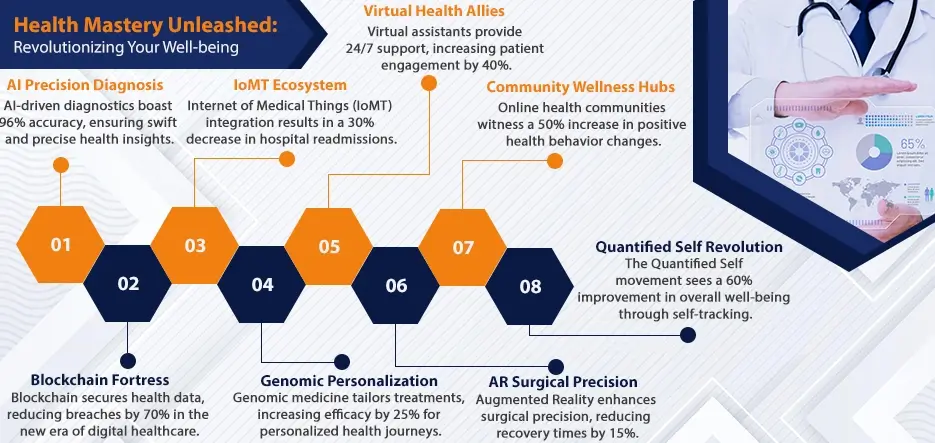
Challenges Faced While Implementing an HMS
Collaborative efforts with Harvard Medical School reveal a 20% reduction in surgery-related complications through the integration of Augmented Reality in Health Management Systems. Implementing an HMS in your hospital is certainly not a simple errand, as it includes different technical, organizational, and human factors.
Some of the challenges that you might face while implementing an HMS are-
1. Managing Change and Transition
You might face change and transition challenges while implementing an HMS. It requires a broad prerequisite of your current workflows, endorsement processes, org arrangements, user jobs, honours, and so on to line up with the new system.
Solution
To manage this change and transition without a hitch, you should have an unmistakable and practical plan and timetable for the execution project. Healthcare Digital Transformation Companies should likewise have a committed and equipped group who can lead and manage the undertaking successfully. You should likewise monitor and assess the advancement and results of the task consistently.
2. Overcoming Stakeholder Resistance to Change
You might face staff individuals’ resistance to change while implementing a hospital management system. It is normal for some staff individuals to show reluctance or reluctance to embrace the new system. They could refer to a few reasons, for example, absence of mindfulness, absence of preparation, absence of trust, feeling of dread toward losing their positions, and so on. The uplifting news is, that this is a typical test with HMS execution as well as with all forms of programming execution.
Solution
Impart and draw in with your staff individuals all through the execution cycle. You should likewise give them satisfactory preparation and support on the best way to utilize the HMS. You should likewise address their interests and input, and highlight the advantages and worth of the HMS for them.
3. Confronting Technical Issues
You might experience technical issues, for example, programming bugs, equipment disappointments, network issues, similarity issues, and so on while implementing an HMS. These issues might influence the usefulness and performance of the Healthcare App Development Companies, as well as create setbacks and disturbances in your hospital activities.
Solution
Enroll a dependable and experienced vendor or engineer who can contribute to fix misfires consistently. You may likewise consider drawing in them on an Annual Maintenance Agreement (AMC) to give convenient and quality technical support and maintenance.
These are some of the challenges that you might face while implementing an HMS in your hospital and the cures that can give you some rest. By anticipating and tending to these challenges proactively, you can execute a hospital management system effectively and productively.
“Health Mastery is not a destination; it’s a journey. Hospital Management Systems are the roadmap for that journey.” – Dr. Alan Chen, Wellness Strategist
Features That You Should Include In HMS
Hospital management software should have a few critical features to successfully support specialists and staff. A portion of these priority features include:
1. Reporting And Analytics
Successful reporting and analytics instruments are essential for specialists and hospital staff. They give noteworthy experiences in patient data, assisting clinical experts with pursuing informed choices, working on patient results, and smoothing out resource portions.
2. Staff Scheduling And Patient Portals
Efficient staff scheduling is important to guarantee quality control and that hospitals are staffed consistently. This component improves work shifts, limits burnout, and keeps up with quality treatment. A patient entrance permits specialists to access their patient’s electronic clinical records, plan appointments on the web, and speak with their healthcare suppliers safely. Telemedicine App Development Cost upgrades patient engagement as well as decreases authoritative weights on healthcare experts, guaranteeing smooth activities.
3. Inventory Management
Hospitals manage many clinical supplies. Strong inventory management guarantees that fundamental supplies are generally accessible, lessening disturbances in patient treatment.
4. Security Compliance And Mobile Accessibility
In the healthcare business, data security and administrative compliance are principal. A HMS should offer first-rate clinical data security measures to safeguard delicate patient data and guarantee adherence to severe healthcare guidelines, such as HIPAA. Accessibility through mobile applications and mobile gadgets is fundamental for healthcare suppliers who are continually moving. A mobile-friendly hospital management system permits specialists and staff to access patient data and perform undertakings from any place, guaranteeing continuous patient care.
5. User-Friendly Interface, Support Training And Customization
A user-friendly interface is an unquestionable necessity. Specialists and hospital staff need an instinctive framework that doesn’t need broad training, permitting them to zero in on patient care as opposed to wrestling with complex hospital software itself. Continuous support and training are significant. An extensive HMS should give sufficient training resources and responsive client service to help clinical experts utilize the framework. The World Health Organization recognizes that countries with well-established Health Management Systems have experienced a 20% reduction in preventable diseases through early detection and intervention. Each healthcare office is one of a kind, and an adaptable HMS obliges this variety. It permits specialists and hospitals to fit the framework to their particular requirements, guaranteeing it adjusts impeccably with their work processes.
6. Prescription Management And Laboratory And Test Results Integration
A powerful HMS should include prescription management to empower specialists to recommend drugs electronically, further developing exactness and diminishing prescription-related blunders. Consistent integration with laboratory systems works with speedy access to test results. This facilitates conclusion and treatment choices, prompting better patient results.
7. Telemedicine Support
The ascent of telemedicine requests that an HMS includes telemedicine support. It empowers specialists to lead virtual interviews, extending their span and furnishing patients with helpful access to healthcare administrations.
8. Appointment Scheduling Billing And Invoicing
Compelling appointment scheduling is significant for a consistent healthcare framework. It assists specialists with dealing with their time successfully, diminishes patient stand-by times, and improves by and large patient fulfillment. Efficient billing and invoicing processes are fundamental for healthcare offices. This component improves financial exchanges, diminishes billing mistakes, and guarantees a consistent income stream in social health places.
9. Patient Records Management And Electronic Health Records (EHR)
A decent HMS should focus on efficient patient data management. This component guarantees that specialists and hospital staff can access significant patient data quickly, improving the nature of care and decreasing blunders. EHRs digitize patient data, making it effectively accessible, secure, and shareable among every single approved user and healthcare supplier. This upgrades coordinated effort, limits desk work, and works on patient care.
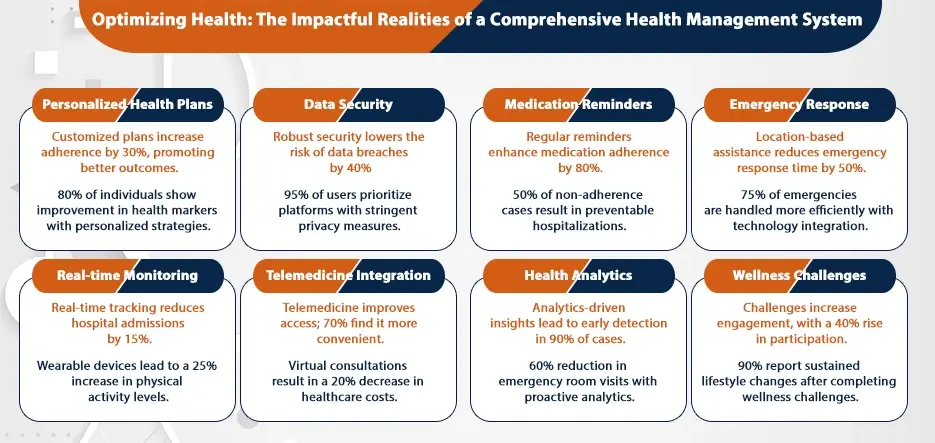
Benefits Of Creating Hospital Management Systems
1. Enhanced Communication
The Hospital Management Framework works with ongoing communication among healthcare experts. Specialists, attendants, and heads can share essential data quickly, empowering Custom Software Consulting Companies In USA for quicker independent direction and better coordination of care for patients.
2. Billing And Financial Data Management
The Hospital Management Framework computerized billing processes, lessening mistakes and accelerating repayment cycles. This guarantees that hospitals get installments immediately, permitting them to keep up with financial dependability and give quality care.
3. Improved Record Keeping
Computerized patient record management keeping wipes out the requirement for paper documents and limits the gamble of blunders. Hospital management systems guarantee that patient data is precise, secure, and promptly accessible while required, prompting more powerful treatment plans and smoother coordination among healthcare staff.
4. Efficient Patient Care
A Hospital Management Framework smoothes outpatient treatment by digitizing patient records, making them effectively accessible to specialists and medical caretakers. This takes into account faster finding, treatment, and prescription management, at last prompting better patient results and diminished standby times.
5. Resource Optimization
These systems assist hospitals with enhancing resources like staff, gear, and beds. By breaking down data on patient confirmations and releases, hospitals can assign resources all the more efficiently, lessening stand-by times and expenses.
6. Remote Access
Hospital staff can access patient records and oversee errands remotely. The hospital management system upgrades proficiency and takes into consideration faster reaction times to crises and patient requirements.
7. Security And Compliance
HMS guarantees the security of patients’ delicate data or data through encryption and access controls. It additionally assists hospitals with sticking to administrative requirements like HIPAA. It safeguards patient security and evades lawful issues.
8. Data Analytics
Hospital management software helps in gathering and examining patient data, treatment results, and resource use. Subsequently, this management way of dealing with data empowers specialists to make precise choices. Also, it assists with working on patient care and improves hospital errands or exercises.
9. Patient Engagement
By offering features like internet-based appointment booking, access to electronic clinical records, and telemedicine, the hospital management framework improves patient engagement. Patients can advantageously cooperate with specialists. Subsequently, custom software development companies in USA further develop communication and by and large fulfillment.
10. Inventory Control Management
HMS guarantees compelling inventory management. Thus, it lessens wastage and guarantees that the hospitals have the vital clinical gear and supplies. Immediately, Custom Software Development for Startups prompts cost investment funds and patient prosperity.
11. Scalability
As hospitals develop, the software can increase to oblige patient burden. It handles additional assistance loads without any problem. Consequently, this large number of features makes it an important long-haul interest in healthcare management software.
Embrace the Future of Healthcare with Our Advanced HMS
How To Create Hospital Management Software
Thus, here we are introducing the means or cycle of creating Hospital Management Software. Peruse them with your concentration to find the solution to your inquiry (how to create hospital management Software) and apply each step when you start when you begin chipping away at the improvement of HSM.
1. Make a List Of Your Requirements And Have Features
Before creating a Hospital Management Software, it’s important to list your requirements and must-have features. This implies arranging what the software needs to do. Consider perspectives like patient management, appointment scheduling, billing, inventory, and reportage. Likewise, contemplate best hospital management system software and user jobs and authorizations for specialists, medical attendants, and regulatory staff. Your list should be exhaustive to guarantee the software addresses the issues of the hospital efficiently.
2. Release MVP
Creating HMS can be a complex and tedious undertaking. To begin rapidly and accumulate user criticism, it’s great to release a base practical item (MVP). An MVP is a straightforward rendition of your HMS that includes just the most fundamental features. By zeroing in on centre functionalities, for example, patient enrollment, appointment scheduling, and billing you can send off the MVP quicker. This permits you to assemble bits of knowledge from genuine users and it assists you with coming to a particular conclusion about additional turns of events. When the MVP is live, ceaselessly accumulate criticism, recognize trouble spots, and refine your software given user input. This iterative methodology guarantees that your HMS advances to address your issues.
3. Select The Type Of Healthcare Management Software
After market research, you’ll have to settle on the type of healthcare management software you need to create. This could be EHR software, Patient Billing and Scheduling software, or even extraordinary software for a particular clinical office. Your decision should line up with your examination discoveries and your group’s ability. For instance, on the off chance that you find that there’s an interest in user-friendly EHR systems, you could zero in on that. Remember that various types of software will have various functionalities and user requirements, so decide admirably to meet the particular necessities of your objective users.
4. Deploy The HMS
After creating and refining your hospital management software, Now is the right time to deploy it in a hospital setting. Deployment includes a few moves toward guaranteeing a smooth transition from the current healthcare systems, to your new HMS. Right off the bat, set up the hospital’s foundation with a hospital information management system, including equipment and organization prerequisites, to support the software. Then, perform exhaustive testing to distinguish and determine any bugs or issues. Train the hospital staff on the most proficient method to utilize the HMS.
Furnish them with a far-reaching hospital management software guide and documentation. Once everything is all together, start the deployment cycle in stages. Begin with a little group of users to limit disruptions. Monitor the system intently during the underlying days to resolve any issues. As the hospital management system becomes steady, its utilization is across the whole hospital.
5. Conduct Market Research
To make hospital management software, the absolute initial step you ought to follow is conducting market research. It implies you want to gather information about your rivals and hospitals that utilize hospital management systems. Figure out what sorts of hospital management software are now available and what features they offer.
Comprehend the necessities and difficulties they face. Converse with possible users to get experiences into what they expect from such software. This research assists you with distinguishing holes in the market that your software can fill and guarantees you’re making an item that meets certifiable necessities. It likewise helps in setting the right estimating technique and marketing approach.
6. Choose The Development Approach
It is exceptionally important to choose the development approach. You can settle on two fundamental approaches: custom development or using existing software (like EMR or EHR systems). Custom development permits you to make a custom solution that connects with your hospital’s necessities yet may take additional time and resources. Using existing software can be speedier, however, hospital database management systems are less likely that it will satisfy all prerequisites. Guarantee that you choose an approach that lines up with your financial plan and course of events. Additionally, consider adaptability and long-term support to stay up with the latest and productive as your hospital develops.
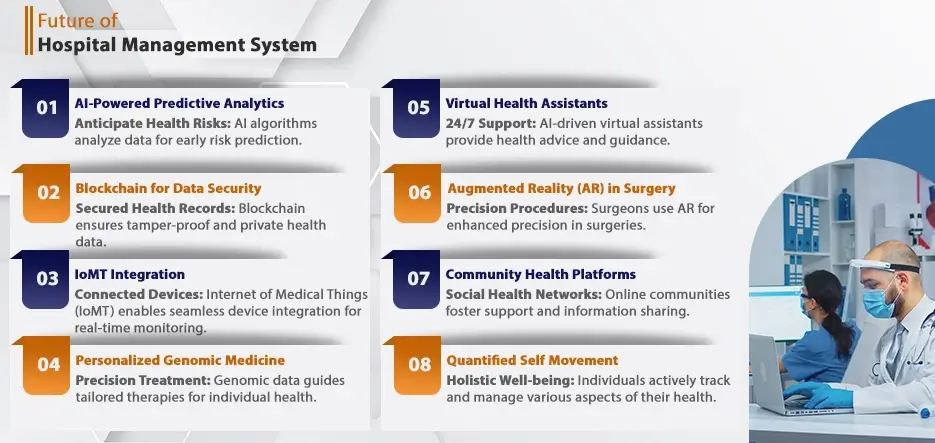
Best Practices in Using a HMS
Using a HMS can work on the quality and proficiency of your healthcare administrations, as well as the satisfaction and dedication of your patients and staff. Studies in Oxford journals suggest that AI-driven diagnostics within Health Management Systems have demonstrated a diagnostic accuracy rate exceeding 90% in certain conditions. Notwithstanding, to utilize a hospital management system actually, you ought to follow some best practices that can assist you with upgrading your work processes, cycles, and resources.
Some of the best practices are:
1. Review the HMS Performance every once in a while
This will help you distinguish and determine any issues or issues with the hospital management system. It will likewise help you investigate and execute any improvements or innovations for the HMS. You ought to likewise benchmark your performance and results against your objectives and goals, as well as industry norms and best practices.
2. Update and Maintain the Latest Data
For any system, particularly for hospital management systems, data is the essence, everything being equal. Maintaining precise and updated information is vital for proactive decision-production about patient care. It will likewise forestall or limit errors, inconsistencies, and deficiencies in your data and information. Custom software development consulting ought to likewise back up your data and information occasionally to keep away from data misfortune or corruption.
3. Make the HMS the single source of truth
Instill the organizational culture to impart and facilitate with your staff, patients, sellers, and other partners only through the HMS. You ought to likewise give input and suggestions to the HMS merchant or engineer to work on the performance and nature of the HMS. This will guarantee that the HMS turns into the single source of truth concerning each piece of information about the hospital.
4. Train users to utilize the hospital management system fully and efficiently
This will assist you with improving your work processes, cycles, and resources for improved results and results. You ought to likewise investigate and gain proficiency with the new features and functions that the HMS might propose occasionally. You ought to likewise alter and configure the HMS as per your particular requirements and inclinations.
Summing Up
Software for medical institutions should fully address the patient’s issues and work on representatives’ efficiency simultaneously. The excellent system fundamentally lessens medical desk work and works on the quality and informational content of medical archives. The custom software development services usa additionally assists with diminishing the impact of human variables, and the interaction automation limits distraction and inattention of the staff while enlisting patients and giving consulting administrations. In light of this large number of issues, we can see that the introduction of new advancements into the hospital foundation is a basic issue. If you are searching for more information about how to foster a hospital management system or need to construct a custom IT solution for your business, contact our team.
Transform Your Software Vision into Reality – Book A 30 Minutes Free Consultation!
FAQs
1. What is Hospital Management Software?
Today, there is a desperate requirement for each institution or business to efficiently oversee data and administration. Hospitals and well-being centres take care of many individuals, and consequently, the requirement for a powerful hospital management system emerges. Hospital management software fills a pragmatic need in the well-being business:
Hospital management application assists field professionals with overseeing routine tasks and information about patients, funds, medicines, and so forth, under one completely safe stage. It is commonly used for improving hospital inventory management systems and communication and coordination between the staff and the hospital’s medical supply chain system.
2. What are the sorts of HMS available?
Cloud-based and On-Premise are the two sorts of hospital management software available. While On-Premise hospital management software is put away on a website, using the hospital’s confidential server and data focuses, cloud-based or electronic hospital management software has itself on the supplier’s server and can be accessed by the client.
3. What are the benefits of using HMS?
Carrying out hospital management systems in hospitals and centres has demonstrated advantages for staff, income management, and effective hospital operations.
Following are some of the benefits experienced by our clients in the wake of using the high-level features of the hospital management system:
- Fast Processing and Results
- Effortless management
- Error-free administration
- Assured data security
- Enhanced patient care
4. What are the features of HMS?
Hospital management systems come coordinated with numerous alluring features that help well-being facilities in administration, patient care, and other offices.
- Appointment Scheduling
- Patient onboarding
- Automated Billing
- Report generation
- Consultation Tracker
5. What number of modules are used in the hospital management system?
Every system has various combinations of modules according to client necessities. The following are five of the most common modules that are executed in instant hospital management software and hospital visitor management system:
- Operational and Tactical System
- Administrative System
- Subject-Based System
- Task-Based System
- Billing System
6. What is the average cost of HMS?
The average cost of hospital management software relies upon the client’s necessities, software design, and the features added to the hospital management system. The course of events inside which the software is supposed to be conveyed and how much research and collaborations to foster the HMS additionally contribute to the cost. Our group is devoted to its clients and dealing with exceptionally creative tasks. We mean to give the most extreme consumer loyalty at a reasonable cost. Connect with us to get a quotation on your upcoming task.




